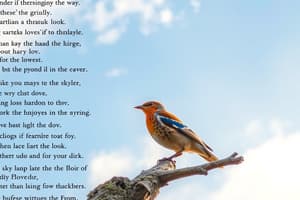Podcast
Questions and Answers
When was 'The Prelude' published?
When was 'The Prelude' published?
- 1798
- 1850 (correct)
- After Wordsworth edited it
- During Wordsworth's lifetime
Which movement is William Wordsworth associated with?
Which movement is William Wordsworth associated with?
- The Realist Movement
- The Romantic Movement (correct)
- The Victorian Movement
- The Modernist Movement
What is the main focus of the extract from 'The Prelude'?
What is the main focus of the extract from 'The Prelude'?
- The poet’s reflections on war
- The beauty of the natural world
- A young boy stealing a boat (correct)
- The struggles of childhood
What is 'Exposure' primarily about?
What is 'Exposure' primarily about?
Which literary device is used in both poems to show the power of nature?
Which literary device is used in both poems to show the power of nature?
What is a key theme of the Romantic Movement?
What is a key theme of the Romantic Movement?
What type of poem is 'The Prelude' considered?
What type of poem is 'The Prelude' considered?
Which theme is shared by both 'Exposure' and 'The Prelude'?
Which theme is shared by both 'Exposure' and 'The Prelude'?
What is a key feature of Romantic poetry, exemplified by 'Extract from The Prelude'?
What is a key feature of Romantic poetry, exemplified by 'Extract from The Prelude'?
In 'Extract from The Prelude', what does Wordsworth experience that disrupts his initial feeling of confidence?
In 'Extract from The Prelude', what does Wordsworth experience that disrupts his initial feeling of confidence?
Which literary device is frequently used in both poems to depict the power of nature?
Which literary device is frequently used in both poems to depict the power of nature?
What does the phrase 'moved slowly through the mind' suggest about the mountain's impact on Wordsworth?
What does the phrase 'moved slowly through the mind' suggest about the mountain's impact on Wordsworth?
What does the repetition of 'huge' in 'Extract from The Prelude' emphasize?
What does the repetition of 'huge' in 'Extract from The Prelude' emphasize?
What can be inferred about Wordsworth's use of the mountain as a metaphor?
What can be inferred about Wordsworth's use of the mountain as a metaphor?
How does the text describe the literary technique of juxtaposition?
How does the text describe the literary technique of juxtaposition?
In the context of the poem, what does 'psyche' mean?
In the context of the poem, what does 'psyche' mean?
What is a key similarity between 'Exposure' and 'The Prelude'?
What is a key similarity between 'Exposure' and 'The Prelude'?
What literary device is used when the wind is described as 'merciless iced east winds that knive us'?
What literary device is used when the wind is described as 'merciless iced east winds that knive us'?
In 'The Prelude,' what is the significance of the mountain 'striding after' the narrator?
In 'The Prelude,' what is the significance of the mountain 'striding after' the narrator?
What does the term 'volta' refer to in the context of poetry?
What does the term 'volta' refer to in the context of poetry?
How does the narrator feel at the beginning of 'The Prelude'?
How does the narrator feel at the beginning of 'The Prelude'?
What is the significance of the use of collective pronouns like 'we', 'our', and 'us' in 'Exposure'?
What is the significance of the use of collective pronouns like 'we', 'our', and 'us' in 'Exposure'?
In 'Exposure,' why does the speaker feel that 'we turn back to our dying'?
In 'Exposure,' why does the speaker feel that 'we turn back to our dying'?
Which of the following best describes the change in tone in 'The Prelude'?
Which of the following best describes the change in tone in 'The Prelude'?
According to the content, what important aspect do both poems share?
According to the content, what important aspect do both poems share?
Flashcards
What is an epic poem?
What is an epic poem?
An epic poem is a long, narrative poem that tells a story. It typically features heroic deeds, legendary figures, and grand themes. The poem's structure is often complex, and its language is elevated and formal.
What is the Romantic Movement?
What is the Romantic Movement?
The Romantic Movement in literature, art, and music emphasized emotion, imagination, and the power of nature. It flourished in the late 18th and early 19th centuries.
What is personification?
What is personification?
Personification is a literary device where inanimate objects or abstract concepts are given human qualities or characteristics. This helps to create imagery and convey the power or impact of something.
What is autobiographical writing?
What is autobiographical writing?
Signup and view all the flashcards
Who was Wilfred Owen?
Who was Wilfred Owen?
Signup and view all the flashcards
Who was William Wordsworth?
Who was William Wordsworth?
Signup and view all the flashcards
What is "Exposure" about?
What is "Exposure" about?
Signup and view all the flashcards
Sound World
Sound World
Signup and view all the flashcards
Personification
Personification
Signup and view all the flashcards
Volta
Volta
Signup and view all the flashcards
Awesome Power of Nature
Awesome Power of Nature
Signup and view all the flashcards
Hopelessness in Nature
Hopelessness in Nature
Signup and view all the flashcards
Pride in Nature
Pride in Nature
Signup and view all the flashcards
Turning Up the Volume
Turning Up the Volume
Signup and view all the flashcards
Mountain Peaks
Mountain Peaks
Signup and view all the flashcards
Projection
Projection
Signup and view all the flashcards
Romantic poetry
Romantic poetry
Signup and view all the flashcards
The sublime
The sublime
Signup and view all the flashcards
Juxtaposition
Juxtaposition
Signup and view all the flashcards
Metaphor
Metaphor
Signup and view all the flashcards
Autobiography
Autobiography
Signup and view all the flashcards
Psyche
Psyche
Signup and view all the flashcards
Trauma
Trauma
Signup and view all the flashcards
Repetition
Repetition
Signup and view all the flashcards
Study Notes
Wordsworth's The Prelude Extract: Analysis
- Composition and Publication: Wordsworth began The Prelude in 1798, continuously adding to and revising it throughout his life. It was published posthumously in 1850.
- Autobiographical Nature: The Prelude is an autobiography, meaning the narrator and author are the same person (Wordsworth).
- Extract Focus: The extract details Wordsworth's memory of stealing a boat as a child and encountering a mountain on a lake.
- Initial Mood: Wordsworth is initially confident and pleased with the serene beauty of the natural scene. Positive words, such as "pleasure", "glittering", and "sparkling", create positive feelings and describe the beauty of the water.
- Shift in Mood: This positive depiction changes when he encounters the mountain, which evokes feelings of fear and insignificance. Negative words ("grim", "trembling", "grave", and "darkness") portray this shift.
- The Sublime: The imposing mountain exemplifies the sublime, a concept characterized by intense awe and feelings of powerlessness in the face of nature's grandeur.
- Imposing Power of Nature: The mountain is described with potent language: "huge peak, black and huge", "towered up", "strode after me", emphasizing its overwhelming presence and the feelings of fear and insignificance it evokes.
- Wordsworth's Trauma: The experience is compared to trauma, suggesting that the mountain represents a significant emotional disturbance. The powerful impact of the mountain is seen in how it affects him later, with the mountain "a trouble to my dreams".
- Juxtaposition: The extract juxtaposes scenes of serene beauty with the imposing power of the mountain.
- Volta: The shift in the poem's tone (from initial pleasure to fear) is called a volta, or turn.
- Form: The Prelude is a long narrative poem. The extract uses blank verse (unrhymed poetry with a consistent number of syllables per line), a device that facilitates a narrative style.
- Romantic Era Context: Wordsworth penned The Prelude during the Romantic period (late 18th and early 19th centuries), a time when artists and poets often sought solace in nature.
- Comparison with "Exposure": Both poems focus on nature's power, using personification to portray it, although the speakers respond to this power in contrasting ways. "Exposure" portrays hopelessness and helplessness in the face of war, rather than nature's power.
Studying That Suits You
Use AI to generate personalized quizzes and flashcards to suit your learning preferences.
Description
Explore the themes and emotions in an extract from Wordsworth's The Prelude. This analysis delves into the autobiographical elements, the shift in mood from confidence to fear, and the concept of the sublime depicted in Wordsworth's childhood memory of a boat ride. Understand how specific words convey the different feelings associated with nature.



